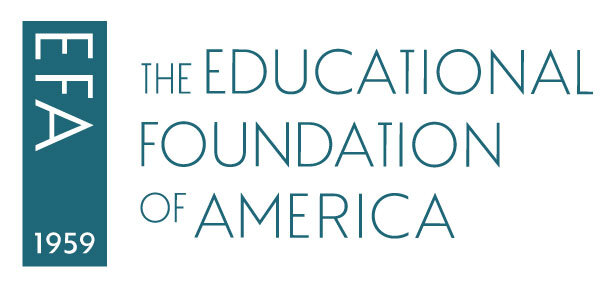
Top Tier Returns with a Fully
Mission-Aligned Portfolio
For more than 30 years, EFA has worked to align our invested endowment, approximately $230 million, with our grantmaking goals, values, and mission. As with our grantmaking, we believe in utilizing investing as a mechanism to create change in the world.
Corporations have an outsized role to play in shaping our collective future. As corporation owners through our endowment, we have a responsibility to ensure that our investing practices align with our values. Mission-driven shareholders with a public mandate to better the world, such as EFA, have a responsibility to encourage companies towards a sustainable future that benefits not only themselves, but also their shareholders, employees, customers, and communities.
This mission-aligned approach to investing has yielded proven results over time. As documented in the annual Commonfund Study, EFA has achieved long-term financial returns that are some of the highest among private foundations.
10-year Annualized Returns as of 12/31/2022 (%)
Commonfund Study, Comparison of EFA with 171 Private Foundations
Early Adopters of ESG
Starting in the early 1980s, in response to man-made environmental disasters such as the nuclear accident at Three Mile Island (1979) and the Exxon Valdez oil spill (1989), EFA began to consider how its investments in some businesses could be contributing to the problems its grantmaking was trying to solve. EFA’s early work to align its investments with its mission began by direct engagement with companies, encouraging them to address issues related to the environmental damage they were causing.
In the 1990s, EFA began participating in multi-year shareholder campaigns, in partnership with As You Sow and others, to improve environmental sustainability at public companies. As examples, these campaigns helped to phase out the use of old-growth timber at home-improvement retailers, to eliminate Styrofoam use at fast-food companies, and to improve recycling and the use of recycled products across a range of industries. Beginning in the 2000s, EFA participated in campaigns to encourage companies to reduce their reliance on coal, methane, and fossil fuels. During this period, EFA also began to avoid investments in companies that were causing environmental damage.
In 2014, EFA was among the original signatories to Divest Invest Philanthropy. Since 2015, our investment portfolio has been 100% fossil-fuel free.
In 2017, EFA began to focus on how its investments supported its Reproductive Health and Justice Program goals. As a result, alongside the Tara Health Foundation, EFA provided seed funding for the Corporate Engagement Program at Rhia Ventures, which mobilizes asset owners to engage with companies to implement good policies and practices on reproductive healthcare. A shareholder resolution filed by EFA in 2022 was the first-ever reproductive healthcare shareholder proposal to be approved by the Securities & Exchange Commission.
Our Investment Practices Today
EFA pursues its mission-aligned investing in five ways:
screening its investments using specific environmental, social, and governance (ESG) criteria to exclude owning companies that do not align with our values;
actively investing in companies pioneering new solutions to address the climate crisis and other issues;
voting our shares on annual corporate resolutions;
leading and participating in shareholder resolution and company engagement campaigns; and
supporting the field of shareholder engagement.
-
In addition to excluding fossil fuels from its portfolio, EFA also screens out companies that do not show best-in-sector practices in labor rights, human rights, corporate governance, and product quality and safety. EFA does not invest in companies that are directly involved in the private prison industry, factory farming or animal testing that is unnecessary and inhumane. EFA limits its investments in companies that manufacture tobacco or weapons by generally not investing in companies where more than 5% of their revenue is derived from these products.
-
Beyond these screens and limits, EFA actively seeks to invest in companies that are creating positive changes in the world. For example, EFA has invested in start-up companies developing electric vehicles, “green” household cleaning products, smart thermostats, and zero-carbon-emission steel. EFA seeks diverse investment managers that focus on creating a just and sustainable future, such as Generation, which focuses on a sustainable world and habitable climate, and Illumen Capital, dedicated to expanding racial and gender equity and awareness across investing.
-
As shareholders, investors can file corporate resolutions to be voted on at a company’s annual meeting; these resolutions request that management follow or refrain from an identified policy and include statements of why this change is important for shareholders and the company. This last part is important — we believe that companies create long-term value by paying attention to their policies and impacts, not just short-term results. EFA also ensures that our shareholder votes on annual company resolutions align with our values and grantmaking goals.
-
As nonprofit entities with charitable missions, foundations have a critical role to play in engaging with corporations to align values and investments. We don’t do this in isolation, however. An ecosystem of organizations work on engaging corporations, and the success of engaging companies depends on growing this field. EFA has supported a network of nonprofit groups such as Ceres, As You Sow, and the Interfaith Center on Corporate Responsibility, which equips investors to dialogue with companies in their portfolios on matters of importance to each investor. EFA has also supported a pilot program for new legal graduate fellowships to expand the field of shareholder advocacy legal services in climate and reproductive rights. Working with our philanthropic colleagues at the Nathan Cummings Foundation and the Jesse Smith Noyes Foundation, in collaboration with Untapped Capital, EFA has recently launched a new training cohort of philanthropic leaders who will work towards integrating shareholder engagement more fully into their foundations’ core activities.
Grantmaking Through Investments
In addition to the mission-aligned investments noted above (also known as mission-related investments, or MRIs), which seek market-rate investment returns alongside mission-related goals, the Foundation makes limited investments directly from its grantmaking programs; these are known as Program-Related Investments (PRIs). Unlike MRIs, PRIs are charitable in intent, and so don’t seek market-rate returns, but can provide potential investment returns.
Some of our recent PRIs:
Prime Coalition: directing catalytic capital to support early-stage, hard tech climate ventures and companies with transformative climate impact potential;
Invest Appalachia: providing credit enhancements, loan guarantees, and other financial tools to support clean energy projects in Appalachia for economically-distressed communities; and
Cadence: developing an over-the-counter birth control pill and lower-cost contraceptives.
Opportunity Alabama: supporting the restoration and adaptive reuse of historic properties in downtown Selma, Alabama, in support of community-centered tourism in the birthplace of America’s civil rights movement. A long-term goal of this investment is to embed ownership stakes in these properties with local nonprofit organizations.
Join Us
Knowing what your foundation owns and ensuring that your foundation’s values are reflected throughout its investment portfolio didn’t begin with EFA, but we are proudly committed to working to make such active ownership a philanthropic best practice. If you are interested in learning more, please click the button below to request a copy of EFA’s Investment Policy Statement and/or connect with a member of our team.



